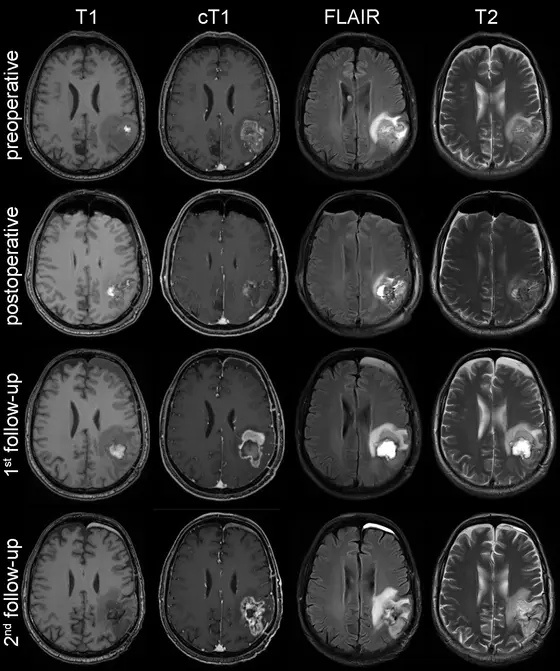Gliomas are the most common and most malignant brain tumors in adults. In Germany, approximately 4,500 people are diagnosed with a glioma every year. The tumors often cannot be completely removed by surgery. Chemotherapy or radiotherapy are only effective to a limited extent because the tumors are highly resistant. New and precisely validated treatment approaches are therefore urgently needed.
One of the essential criteria for the precise assessment of the efficacy of a new therapy for brain tumors is the growth dynamic, which is determined by MRI. However, the manual measurement of tumor expansion in two planes in the contrast-enhanced MRI scans is prone to errors and leads to slightly different results. “This can have a negative effect on the assessment of therapy response and hence the reproducibility and precision of scientific statements based on imaging,“ explains Martin Bendszus, Medical Director of the Department of Neuroradiology at the University Hospital in Heidelberg.
In their current study, doctors and scientists from the University Hospital of Heidelberg and the German Cancer Research Center (DKFZ) describe the huge potential of machine learning methods in radiological diagnostics. The team has developed neuronal networks in order to assess and clinically validate the therapeutic response of brain tumors on the basis of MRI in a standardized and fully automated way. A team led by Philipp Kickingereder from the Department of Neuroradiology at Heidelberg University Hospital, researchers from the Division of Medical Image Processing (head: Klaus Maier-Hein) at the German Cancer Research Center and colleagues from the National Center for Tumor Diseases (NCT) and the Neurological Department of the University Hospital Heidelberg (Medical Director: Wolfgang Wick) worked together on this project.
Using a reference database with MRI scans of almost 500 brain tumor patients at Heidelberg University Hospital, the algorithms were able to automatically recognize and localize brain tumors using artificial neural networks. In addition, the algorithms were trained to volumetrically measure the individual areas (contrast medium-absorbing tumor portion, peritumoral edema) and to precisely assess the response to therapy.
The results were validated in cooperation with the European Organization for Research and Treatment of Cancer (EORTC). “The evaluation of more than 2,000 MRI scans of 534 glioblastoma patients from all over Europe shows that our computer-based approach allows a more reliable assessment of therapy response than the conventional method of manual measurement. We were able to improve the reliability of the assessment by 36 percent. This can be crucial for the image-based assessment of therapy efficacy in clinical trials. The prediction of overall survival was also more precise with our new method,“ explains Kickingereder.
The goal of the Heidelberg physicians and scientists is to use the promising technology for the standardized and fully automated assessment of the therapy response of brain tumors as quickly as possible in clinical studies and, in future, also in clinical routine. In addition, the researchers designed and evaluated a software infrastructure that enables the complete integration of the new technique into existing radiological infrastructure. “In this way, we are creating the prerequisites for broad application and fully automated processing and analysis of MRI scans of brain tumors within a few minutes,“ explains Klaus Maier-Hein.
The new technology is currently being re-evaluated at the NCT Heidelberg as part of a clinical study to improve the treatment of glioblastoma patients. “For precision therapies, a standardized and reliable assessment of the effectiveness of the new treatment approaches is of outstanding importance. The technology we have developed may be able to make a decisive contribution here,“ explains Wolfgang Wick.
“With this study, we were able to demonstrate the great potential of artificial neural networks in radiological diagnostics,“ summarizes Philipp Kickingereder. “In the future, we want to advance the technology for automated high-throughput analysis of medical image data and transfer it not only to brain tumors but also to other diseases such as brain metastases or multiple sclerosis,“ adds Klaus Maier Hein.
Kickingereder P, Isensee F, Tursunova I, Petersen J, Neuberger U, Bonekamp D, Brugnara G, Schell M, Kessler T, Foltyn M, Harting I, Sahm F, Prager M, Nowosielski M, Wick A, Nolden M, Radbruch A, Debus J, Schlemmer HP, Heiland S, Platten M, von Deimling A, van den Bent MJ, Gorlia T, Wick W, Bendszus M, Maier-Hein KH. Automated quantitative tumor response assessment of MRI in neuro-oncology with artificial neural networks: a multicenter, retrospective study. Lancet Oncology 2019, dx.doi.org/10.1016/S1470-2045(19)30098-1



